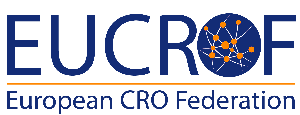EUCROF - the European CRO Federation - is pleased to present its innovative e-learning platform, where you can find all the educational materials delivered in the webinars organised by the EUCROF Events and Training (E&T) Working Group.
Developing
training and educational programmes for clinical research is one of the main aims
of the Federation, which implemented this e-learning platform to foster the exchange
of educational materials and to assist its members with educational programmes.
A webinar is a very effective tool to reach these goals, therefore EUCROF systematically
delivers webinars focused on specific areas of interest for its members.
e-LearnIN, EUCROF’s
e-learning platform has been designed to provide webinar participants with a
virtual space to remain in contact with the teacher/speaker after the webinar’s
end and help them retrieve media and documents proposed as supportive materials.
This will allow participants to improve their experience and fulfil more easily
the purpose of the webinars.
For each
EUCROF webinar you can find on this
platform the educational materials presented during the webinar (pdf of the
presentation), the short bio of the speaker, the recorded video of the webinar
and any possible additional materials (publications, papers, exercises, etc.).
Moreover, at
the end of each webinar, a forum discussion will be opened i.e. a virtual room
that will be accessible through the EUCROF e-learning platform at the end of
the webinar and will allow the participants to ask further questions to the speaker
or start an open discussion on the topic of the webinar.
Here you can
have a look at the list of the future and past EUCROF Webinars.
About the EUCROF Association
 EUCROF
Association was founded in October 2005, with the aim to promote high quality clinical research in Europe as well as to represent the interests of CROs in interactions with authorities, regulatory bodies, companies, researchers, experts and patients. Favouring a close relationship between CROs and Stakeholders is one of the main scopes of EUCROF, that is always proactive in facilitating the exchange of information within the clinical research community.
EUCROF
Association was founded in October 2005, with the aim to promote high quality clinical research in Europe as well as to represent the interests of CROs in interactions with authorities, regulatory bodies, companies, researchers, experts and patients. Favouring a close relationship between CROs and Stakeholders is one of the main scopes of EUCROF, that is always proactive in facilitating the exchange of information within the clinical research community.
Some numbers…
The
Federation consists of Members/Associate Members from 25 EU countries. It stands for
over 300 member CROs and over 20,000 employees.
Since
December 2006, the Federation is managed by an Executive Board which holds
monthly meetings. Also, the Full Members Board meetings are held monthly. Each
year, the Federation organises two face to face General Meetings (in Spring and
Winter) with all its Members.
EUCROF developed
the creation of 12 Working Groups, which represent an open area of discussion
on specific areas of interest for Members.
Do you want
to know more about EUCROF Working Groups and their initiatives? Please click here.
EUCROF Events and Training Working Group
The EUCROF
Events and Training (E&T) Working Group (WG) aims at delivering activities
to build relationships across organisational boundaries as well as at giving members
(and sometimes non-members) the opportunity to develop skills, expertise and
grow within their respective role. The WG is proactive in identifying, supporting
and promoting good practices in education in clinical research and delivering
accredited training activities.
It also
provides a forum for discussion of key issues impacting clinical research and
opportunities for learning and allows to enhance professional competence as
well as a wider confidence and understanding of clinical research. The members
of this WG are engaged in activities aimed at promoting and sharing expertise
and developments, determining and setting overall strategic direction for CROs
related education and training matters, and liaising with other relevant
organisations, to ensure that the work of the group is up to date.
For more
information, please have a look at E&T WG leaflet.
If you are
interested in becoming a member of this working group, please contact the EUCROF
Secretariat at info@eucrof.eu or the Chair of the Working Group Donato Bonifazi
at ceo@cvbf.net.
Questions?
Should you have any questions about registration, do not hesitate and contact us by email elearnin@eucrof.eu.
 Spain is one of the world leading countries in clinical research and was the top 1 country in the EU with the highest participation in clinical trials with Medicinal Products in 2023.
Spain is one of the world leading countries in clinical research and was the top 1 country in the EU with the highest participation in clinical trials with Medicinal Products in 2023.

 All clinical trials that will not be finished in the EU/EEA until the end of the transition period (30 January 2025) need to transit from the EU Directive 2001/20/EC (CTD) to the EU Regulation 536/2014 (CTR). Until 30 January 2025, the transition must be submitted, validated, assessed, and authorised, otherwise the clinical trial is being conducted without authorisation which is considered non-compliant under current law.
All clinical trials that will not be finished in the EU/EEA until the end of the transition period (30 January 2025) need to transit from the EU Directive 2001/20/EC (CTD) to the EU Regulation 536/2014 (CTR). Until 30 January 2025, the transition must be submitted, validated, assessed, and authorised, otherwise the clinical trial is being conducted without authorisation which is considered non-compliant under current law.
 In today's competitive environment and due to the high turnover of physicians, there is a reduced access to physicians, increased competition, and reduced experience to advance clinical research programs. As investigators are the connection between patients and the clinical trial and successful physician engagement significantly impacts patient recruitment and retention, a solid investigator identification and selection process is more critical than ever. Yet, with so many factors to consider, it can be challenging to know where to start.
In today's competitive environment and due to the high turnover of physicians, there is a reduced access to physicians, increased competition, and reduced experience to advance clinical research programs. As investigators are the connection between patients and the clinical trial and successful physician engagement significantly impacts patient recruitment and retention, a solid investigator identification and selection process is more critical than ever. Yet, with so many factors to consider, it can be challenging to know where to start. The evolving landscape of clinical research presents sponsors with challenges such as faster recruitment, better compliance, and amongst sustained patient retention. Active patient engagement throughout the trial journey is crucial to address these challenges. Involving patients early offers valuable insights, improving protocol design and study execution.
The evolving landscape of clinical research presents sponsors with challenges such as faster recruitment, better compliance, and amongst sustained patient retention. Active patient engagement throughout the trial journey is crucial to address these challenges. Involving patients early offers valuable insights, improving protocol design and study execution. Adverse Outcome Pathways are a structural representation of a sequence of biological events that lead to an adverse outcome, considered important for risk assessment. The construct assembles existing knowledge about biological events and pragmatically describes the action of a substance and subsequent linked molecular and cellular mechanisms, by which an adverse event can be fully described and characterized.
Adverse Outcome Pathways are a structural representation of a sequence of biological events that lead to an adverse outcome, considered important for risk assessment. The construct assembles existing knowledge about biological events and pragmatically describes the action of a substance and subsequent linked molecular and cellular mechanisms, by which an adverse event can be fully described and characterized. Software is becoming increasingly common in healthcare and clinical research. Therefore, it is good to know whether you are dealing with Medical Device Software (MDSW) and with the Medical Device Regulation (MDR). Not only MDSW manufacturers are confronted with the MDR, but also the pharmaceutical and food industries, not to mention researchers and healthcare providers.
Software is becoming increasingly common in healthcare and clinical research. Therefore, it is good to know whether you are dealing with Medical Device Software (MDSW) and with the Medical Device Regulation (MDR). Not only MDSW manufacturers are confronted with the MDR, but also the pharmaceutical and food industries, not to mention researchers and healthcare providers. A hidden gem among the Eastern European Clinical Trial locations, Georgia has recently adopted an efficient regulatory submission algorithm that allows full clinical trial approval within 4-6 weeks.
A hidden gem among the Eastern European Clinical Trial locations, Georgia has recently adopted an efficient regulatory submission algorithm that allows full clinical trial approval within 4-6 weeks. Give an overview of the regulatory landscape for paediatric research, review specifics and most important challenges with corresponding solutions in paediatric drug development and review specifics and most important challenges with corresponding solutions in paediatric drug development.
Give an overview of the regulatory landscape for paediatric research, review specifics and most important challenges with corresponding solutions in paediatric drug development and review specifics and most important challenges with corresponding solutions in paediatric drug development. After several years of work, the European Federation of CROs (EUCROF) is close to the finalisation of a GDPR Code of Conduct for clinical vendors. This Code sets out the practical terms of compliance with the GDPR, in the specific field of clinical research and particularly Clinical Research Service Providers.
After several years of work, the European Federation of CROs (EUCROF) is close to the finalisation of a GDPR Code of Conduct for clinical vendors. This Code sets out the practical terms of compliance with the GDPR, in the specific field of clinical research and particularly Clinical Research Service Providers. Monitoring is a key component in clinical trials. ICH GCP R(2) defines the purpose of monitoring to verify that: a) The rights and well-being of human subjects are protected. b) The reported trial data are accurate, complete, and verifiable from source documents. c) The conduct of the trial is in compliance with the currently approved protocol/amendment(s).
Monitoring is a key component in clinical trials. ICH GCP R(2) defines the purpose of monitoring to verify that: a) The rights and well-being of human subjects are protected. b) The reported trial data are accurate, complete, and verifiable from source documents. c) The conduct of the trial is in compliance with the currently approved protocol/amendment(s).  The MDR has been in effect for over a year now. So high time for sharing experiences and lessons learned that benefit us all as medical device researchers!
The MDR has been in effect for over a year now. So high time for sharing experiences and lessons learned that benefit us all as medical device researchers!



 A person centric approach is a new developing concept in Clinical Trials where all the different participating groups perspectives are considered in order to improve efficiency and overall experience.
A person centric approach is a new developing concept in Clinical Trials where all the different participating groups perspectives are considered in order to improve efficiency and overall experience. As of January 31st, 2022 all research on human subjects with medicinal products in the EU need to be submitted via the EMA Clinical Trial Information System, the CTIS. In the current transition period, organizations focus on the setup of the optimal organisation model in CTIS, which ensures a smooth collaboration between CROs and Sponsors and enables optimal use of the standardized timelines of EU CTR.
As of January 31st, 2022 all research on human subjects with medicinal products in the EU need to be submitted via the EMA Clinical Trial Information System, the CTIS. In the current transition period, organizations focus on the setup of the optimal organisation model in CTIS, which ensures a smooth collaboration between CROs and Sponsors and enables optimal use of the standardized timelines of EU CTR. With the EU Clinical Trial Regulation becoming effective on 31 January 2022, a new era of clinical trials with medicinal products has begun in the EU/EEA. The EU legislator provided for a 3-year transition period in which the former system under the EU Clinical Trials Directive and the new system under the EU Clinical Trial Regulation are available in parallel. Sponsors need to know how to best use this period for ongoing clinical trials, but maybe also for trials that are soon to be submitted. Strategic decisions will be necessary and the switch from one legal framework to the other must be well understood.
With the EU Clinical Trial Regulation becoming effective on 31 January 2022, a new era of clinical trials with medicinal products has begun in the EU/EEA. The EU legislator provided for a 3-year transition period in which the former system under the EU Clinical Trials Directive and the new system under the EU Clinical Trial Regulation are available in parallel. Sponsors need to know how to best use this period for ongoing clinical trials, but maybe also for trials that are soon to be submitted. Strategic decisions will be necessary and the switch from one legal framework to the other must be well understood. 
 Since the outbreak of COVID-19, clinical trials have become even more complex and competitive. In order to ensure success and meet patient enrollment targets, sponsors not only need to attract the best investigator sites, but also need to focus firmly on the patient through new ways of working, such as utilizing new routes and adjusting study protocols, including a rise in demand for direct-to-patient delivery.
Since the outbreak of COVID-19, clinical trials have become even more complex and competitive. In order to ensure success and meet patient enrollment targets, sponsors not only need to attract the best investigator sites, but also need to focus firmly on the patient through new ways of working, such as utilizing new routes and adjusting study protocols, including a rise in demand for direct-to-patient delivery. Clinical trials are research studies that use a group of participants to test health-related treatments or interventions. Historically, those studies have occurred mostly in centralized settings. This means that clinical trial visits involved the participant going to where the study principal investigators were practicing their regular duties, i.e. in clinics, hospitals or physician offices.
Clinical trials are research studies that use a group of participants to test health-related treatments or interventions. Historically, those studies have occurred mostly in centralized settings. This means that clinical trial visits involved the participant going to where the study principal investigators were practicing their regular duties, i.e. in clinics, hospitals or physician offices. This webinar on electronic Informed Consent (eConsent) addresses the practical considerations when implementing eConsent. This topic has become an ever increasingly important topic as remote strategies and decentralised clinical trials are being deployed. The session starts with an introduction to the eConsent Implementation Practical Guide, which was published earlier this year. The Guide was developed by EUCROF and eClinical Forum members and addresses key themes and hot topics and provides a view on the modernisation of the clinical trials informed consenting process, including the current perception and shift of eConsent adoption in light of the COVID-19 pandemic.
This webinar on electronic Informed Consent (eConsent) addresses the practical considerations when implementing eConsent. This topic has become an ever increasingly important topic as remote strategies and decentralised clinical trials are being deployed. The session starts with an introduction to the eConsent Implementation Practical Guide, which was published earlier this year. The Guide was developed by EUCROF and eClinical Forum members and addresses key themes and hot topics and provides a view on the modernisation of the clinical trials informed consenting process, including the current perception and shift of eConsent adoption in light of the COVID-19 pandemic. …not anymore about whether it is possible, but about how soon it will be achieved.
…not anymore about whether it is possible, but about how soon it will be achieved.
 As of January 2022, only 9 months from now, all scientific research with
medicinal products in the EU need to be submitted via the Clinical
Trial Information System, the CTIS. To make sure all future users of the
CTIS system, both sponsors and member states, are familiar with the
settings and way-of-working in the system, the EMA has setup a training
program.
As of January 2022, only 9 months from now, all scientific research with
medicinal products in the EU need to be submitted via the Clinical
Trial Information System, the CTIS. To make sure all future users of the
CTIS system, both sponsors and member states, are familiar with the
settings and way-of-working in the system, the EMA has setup a training
program. The Council of the European Union, on 7th December 2015, granted
pan-community policy recognition for “personalized medicine for
patients”, placing the theme among the EU priorities for the next
decades and inviting the Member States and the European Commission to
engage in reaching its full potential.
The Council of the European Union, on 7th December 2015, granted
pan-community policy recognition for “personalized medicine for
patients”, placing the theme among the EU priorities for the next
decades and inviting the Member States and the European Commission to
engage in reaching its full potential. This webinar on electronic informed consent (eConsent) addresses the practical considerations when implementing eConsent. It introduces the EUCROF Implementation Practical Guide to eConsent which addresses key themes and hot topics, and provides a view on the modernization of the clinical trials informed consenting process, including the current perception shift of eConsent adoption in light of the COVID-19 pandemic.
This webinar on electronic informed consent (eConsent) addresses the practical considerations when implementing eConsent. It introduces the EUCROF Implementation Practical Guide to eConsent which addresses key themes and hot topics, and provides a view on the modernization of the clinical trials informed consenting process, including the current perception shift of eConsent adoption in light of the COVID-19 pandemic. Software is used widely in clinical trials: from managing worldwide
trials to finding and scheduling patients, gathering trial data, and
analyzing trial results.
Software is used widely in clinical trials: from managing worldwide
trials to finding and scheduling patients, gathering trial data, and
analyzing trial results.  The
The  The patient centric benefits of electronic informed consenting (eConsent) technologies have been well documented, from the provision of better educational mechanisms of informing patients and overall improved comprehension of the study. There is variability in permissible laws around the European region and globally to be aware of.
The patient centric benefits of electronic informed consenting (eConsent) technologies have been well documented, from the provision of better educational mechanisms of informing patients and overall improved comprehension of the study. There is variability in permissible laws around the European region and globally to be aware of. Hospitals are over-burdened and people have to stay home as much as possible. How are we dealing with study visits and other aspects of the trials? This webinar sheds light on a risk-based approach to ongoing trials and the international guidance that has been released, to protect trial subjects as much as possible and limit the damage to ongoing trials as much as possible. The webinar highlights the situation for the sites as well as for the sponsor/CROs, goes into dealing with quality control, and looks to find opportunities that may come from this difficult time.
Hospitals are over-burdened and people have to stay home as much as possible. How are we dealing with study visits and other aspects of the trials? This webinar sheds light on a risk-based approach to ongoing trials and the international guidance that has been released, to protect trial subjects as much as possible and limit the damage to ongoing trials as much as possible. The webinar highlights the situation for the sites as well as for the sponsor/CROs, goes into dealing with quality control, and looks to find opportunities that may come from this difficult time. Since June 2019, a new EU Guideline on paper and electronic Trial Master File (TMF) is in effect. The Guideline offers clarifications in many aspects. For example, the requirements on electronic TMFs (eTMFs) are clearly stipulated and the essential documents listed in ICH-GCP are supplemented by additional important documents. Emphasis is given to the interface between sponsors and CROs by providing many elements that should be present in either contractual agreements or other documents that describe the cooperation between the parties.
Since June 2019, a new EU Guideline on paper and electronic Trial Master File (TMF) is in effect. The Guideline offers clarifications in many aspects. For example, the requirements on electronic TMFs (eTMFs) are clearly stipulated and the essential documents listed in ICH-GCP are supplemented by additional important documents. Emphasis is given to the interface between sponsors and CROs by providing many elements that should be present in either contractual agreements or other documents that describe the cooperation between the parties.


 The EUCROF Paediatric Working Group is pleased to present the first Training on
The EUCROF Paediatric Working Group is pleased to present the first Training on Nowadays, the collection, analysis and processing of data originated from a clinical study or for marketing settings is supported by specialized applications. Therefore, validation of computerized systems has become a central aspect in CRO’s daily work.
Nowadays, the collection, analysis and processing of data originated from a clinical study or for marketing settings is supported by specialized applications. Therefore, validation of computerized systems has become a central aspect in CRO’s daily work. A year ago, the GDPR came into effect. We were told about consent. We knew the consent. The two concepts seemed identical. It would be quite simple to reconcile the GDPR with the CTR.
A year ago, the GDPR came into effect. We were told about consent. We knew the consent. The two concepts seemed identical. It would be quite simple to reconcile the GDPR with the CTR. With the increasing complexity of the clinical trials, a need has surfaced for emphasising critical vs less important aspects of clinical trial management. Analysis for the efficacy of the traditional approach to monitoring of clinical trials demonstrated an unfavourable ratio between efforts and effect. ICH GCP E6 R2 defines innovative approaches, which include Quality Risk Management, Quality-By-Design, prioritised resourcing and risk-based monitoring. This webinar will focus on risk-based monitoring as a principal measure for improving the quality and effect of the outcome of the clinical trials monitoring, whilst respecting resourcing needs. Other main topics will include remote and centralized monitoring and their role in the risk-based approach.
With the increasing complexity of the clinical trials, a need has surfaced for emphasising critical vs less important aspects of clinical trial management. Analysis for the efficacy of the traditional approach to monitoring of clinical trials demonstrated an unfavourable ratio between efforts and effect. ICH GCP E6 R2 defines innovative approaches, which include Quality Risk Management, Quality-By-Design, prioritised resourcing and risk-based monitoring. This webinar will focus on risk-based monitoring as a principal measure for improving the quality and effect of the outcome of the clinical trials monitoring, whilst respecting resourcing needs. Other main topics will include remote and centralized monitoring and their role in the risk-based approach. In literature there are more and more publications raising concerns about the interpretation and misuse of the p-values, in some cases to support decision-making. This is known as the “reproducibility crisis” and it is a primary concern for the biomedical research and pharmaceutical industry.
In literature there are more and more publications raising concerns about the interpretation and misuse of the p-values, in some cases to support decision-making. This is known as the “reproducibility crisis” and it is a primary concern for the biomedical research and pharmaceutical industry. Many organisations are trying to exploit more value from their data to improve their products and services, offer new ones and optimise their own internal operations. With the General Data Protection Regulation (GDPR) in place, these organisations need to determine the lawful basis for such activities. De-identification techniques, such as pseudonymisation and anonymisation, can play an important role in facilitating such secondary uses and disclosures of data. In regard to de-identification, the GDPR introduces nuances that have not previously been seen, recognising the existence of different levels of de-identification and explicitly adding references to pseudonymisation as an intermediate form of de-identification. This webinar will describe pseudonymisation and anonymisation techniques, specifically for clinical trial data, and how these fit within the GDPR regulatory framework.
Many organisations are trying to exploit more value from their data to improve their products and services, offer new ones and optimise their own internal operations. With the General Data Protection Regulation (GDPR) in place, these organisations need to determine the lawful basis for such activities. De-identification techniques, such as pseudonymisation and anonymisation, can play an important role in facilitating such secondary uses and disclosures of data. In regard to de-identification, the GDPR introduces nuances that have not previously been seen, recognising the existence of different levels of de-identification and explicitly adding references to pseudonymisation as an intermediate form of de-identification. This webinar will describe pseudonymisation and anonymisation techniques, specifically for clinical trial data, and how these fit within the GDPR regulatory framework.